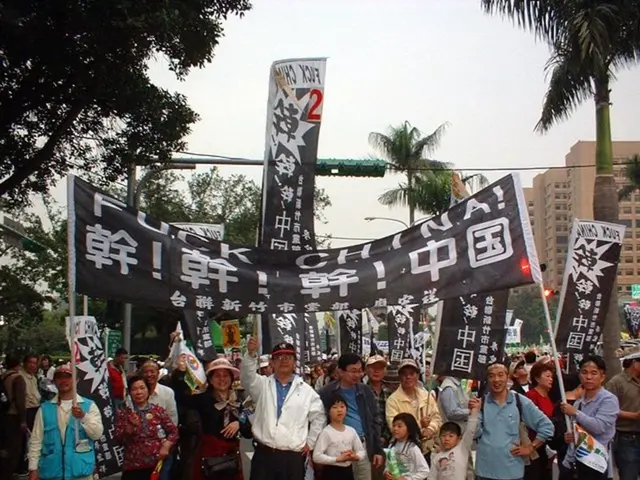Women-Only Matches in Iran's Football Arena
Football stadiums in Iran Close Entry to Males Due to Recent Events
The Iranian government, renowned for barring female fans from men's football matches, threw a curveball by banning male spectators from matches between Sepahan and Persepolis teams.
Recently, the disciplinary committee of the country's football federation decreed that these teams should play their upcoming season's matches in the absence of male spectators, welcoming only female fans. This ruling ensued after some male fans inspected and abused a group of women during their last match on May 1st.
While some regarded this move as another instance of gender discrimination, the majority of domestic media, who previously protested against the exclusion of women from football stadiums in past years, greeted it with open arms.
Tabnak, a local website, commented, "For years, male-dominated football stadiums in Iran have marginalized women. Now, with the disciplinary committee's groundbreaking decision, we will witness female-only stadiums, signifying a major shift in the status of women in Iranian society." Khabar sports daily deemed this decision as "shattering taboos," while simultaneously criticizing the government's oppressive policies on women's presence in stadiums.
International Relations: Iran and Egypt Converse Amid Regional Unrest
Local media in Tehran have disclosed the potential rekindling of relationships between Iran and Egypt, in harmony with Tehran's efforts to strengthen ties with other regional nations impacted by Israel's war in Gaza.
According to the country's official news agency, IRNA, officials from both countries have been working to improve their political and economic relations over the past few months. Iran and Egypt ended their diplomatic ties after the 1979 revolution due to Egypt's hosting of the last Shah of Iran. However, attempts to resume relations began in 2012 under Mohamed Morsi's presidency, only to be put on hold by the 2013 coup led by the then army general Abdel Fattah el-Sisi.
IRNA reported that foreign ministers from both nations met to revive bilateral relations, with the presidents of Iran and Egypt also meeting on the sidelines of the Islamic Summit Conference earlier this month. Discussions also covered parliamentary speakers and economy ministers from both countries.
Arman Meli daily noted efforts by both countries to restore relations, as well as Iran's strategy to surmount political isolation in the Middle East. The newspaper stated, "Forming alliances between Iran and Egypt is notably easier compared to the complexities involved in restoring relations between Iran and Saudi Arabia." The paper also indicated that the process of re-establishing relations between Iran and Egypt experienced interruptions following the outbreak of the war in Gaza because of divergent viewpoints over the conflict. Yet, Arman Meli emphasized that dialogue had started to mitigate these issues.
Professor Zibakalam Behind Bars
The incarceration of Sadegh Zibakalam, a distinguished retired university professor, sparked an uproar over the stifling of freedom of expression. Having faced numerous court summonses and trials in recent years due to his critical interviews, Zibakalam had never before been imprisoned.
Local media broke the news on Monday that Zibakalam was sentenced to three years in prison over three cases in which he was found guilty of "propaganda activity against the regime" and "publishing unverified and fantastical content." Khabar Online, which interviewed Zibakalam the day before his arrest, reported on the release of his latest book at the Tehran International Book Fair titled "Why I am Not Arrested" on the same day he was imprisoned. The book delves into his personal experiences post-1979 revolution.
When asked about his imprisonment, Zibakalam stated, "They prefer to silence me with a phone call rather than imposing jail time because they understand that I can be controlled through simple means. If they demand that I refrain from writing or appearing on Khabar Online, I will comply."
- The opinion section of a local news outlet, Tabnak, expressed excitement over the news of women-only football matches in Iran, seeing it as a step towards reducing gender discrimination in sports.
- The media in Iran has been discussing the potential rekindling of diplomatic relations between Iran and Egypt, with both nations working to improve their political and economic ties.
- Professor Sadegh Zibakalam, a renowned retired academic, was recently sentenced to three years in prison for his critical remarks against the regime, sparking debates about the suppression of freedom of expression in Iran.
- While covering Iran's football arena, Khabar Online reported on the release of Zibakalam's latest book titled "Why I am Not Arrested," just a day before his imprisonment.
- In the Middle East, Egypt and Iran are among the countries trying to reestablish their diplomatic ties, though the process has been affected by conflicting views over the Israel-Palestine issue.
- Analysts suggest that forming alliances between Iran and Egypt might be easier than restoring relationships with Saudi Arabia due to the complex political landscape in the Middle East.
- The regional unrest has led Iran to engage in conversations with Egypt, with both nations aiming to strengthen ties and establish peace amidst increasing conflicts in the Middle East.








